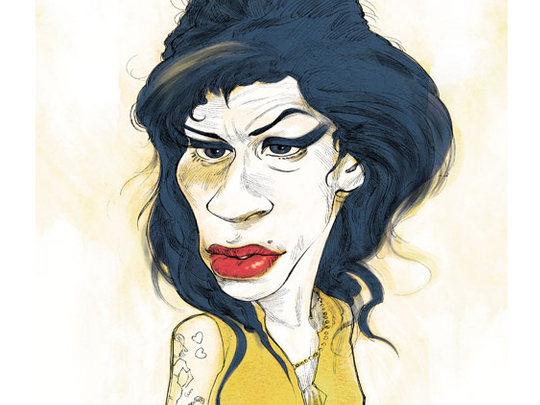
Amy Winehouse hadn't released an album in four years, hadn't had a hit in just as long, and when she performed on stage, the headlines she usually drew were for atrocious performances. She was an addict who, like so many performers before her, let her talents fall prey to a drugged-up lifestyle.
Still, she transfixed. Tabloids chronicled her many tribulations, and fans patiently waited for a third album, knowing that with that amazing voice, along with her bitterly honest lyrics, she could eventually return to form and be that riveting singer-songwriter who captured the world's attention with the self-revelatory Rehab.
But on Saturday, as Winehouse's body was removed from her London apartment, it became clear that that much-anticipated rebirth from the depths of ruin would not occur.
With Winehouse's death at age 27 — joining the ranks of drug-addled rock stars Jimi Hendrix, Janis Joplin, Kurt Cobain and Jim Morrison, who died at the same age — she is in danger of being remembered as a caricature, a life embodied by one signature song, Rehab.
But perhaps now, we can appreciate her for what she was — a dazzling, versatile singer blessed with a mind that produced lyrics that were coarse, hilarious, heartbreaking and revelatory, and always spellbinding.
Jazz greats and modern
Just as Winehouse was so much more than a drug addict, her music was so much more — and richer — than Rehab. Certainly, it was the song that made her a worldwide sensation — it also captured her record and song of the year honours at the Grammys in 2008. But the former teen celebrity came into her own as an artist a few years before, with the 2003 album Frank. Whereas Black to Black relied heavily on a retro, 1960s soul groove, Frank harkened to an even earlier time. On the album, she enveloped a world inhabited by jazz greats like Ella Fitzgerald and Dinah Washington, yet decidedly modern: One song was titled [Expletive] Me Pumps.
Her malleable voice had great range, and expertly embodied the emotion of the moment — from sassy defiance to lovelorn longing. The album made her a hit in her native Britain, and also made the spotlight white-hot on the singer, and her apparent demons.
Tabloids chronicled her drunken behaviour, drug use, dramatic weight loss, and troubled love life — it was around this time she became involved with Blake Fielder-Civil, who would later become her husband, as well as her drug partner.
Though Winehouse would remain a fixture in the press, it would be more than three years for Back to Black to come out.
Musically, Winehouse delivered. The album was considered one of the best of that year, and will likely be considered as one of the best of her generation. Delving into her own warped mindset, the album chronicled her troubled romantic life and the despair over it with sultry brilliance.
Rehab was the album's biggest single, becoming a top 10 hit. While the album didn't spawn any follow-up hits, it was a cohesive gem that transfixed the music world.
Although she was a musical triumph, she became better known to the masses worldwide for her precipitous decline into the depths of drug addiction. When she put out Back to Black, she declared herself sober: by the end of 2007, she was dealing with troubles with the law, failed attempts at rehab, erratic behaviour, and cancelled concerts.
Self-destructive
Still, she was the belle of the Grammys in 2008 as she captured five trophies. The fact that she could not attend the Los Angeles ceremony because she was in rehab only crystallised her reputation as an extremely fragile, self-destructive persona.
The night was the highlight of her life, and a moment she could never recapture. Instead of taking the path toward sobriety, she descended into more drug-induced madness. She appeared at concerts sporadically, and when she did, often gave incoherent, dishevelled performances that angered the crowds. At times, she also flaunted her drug use in the media.
Musically, with the exception of an occasional recording here and there, she faded into the background.
Still, many music fans were still waiting for her comeback. But with each moment that passed, it seemed unlikely that she would be able to get herself together for such an undertaking. Though a new album was teased for 2011, she clearly wasn't in any shape to sing — In June, she checked into a clinic that treats drug problems. Later that month, she cancelled her European tour.
So, like so many deeply disturbed performers, Winehouse's life ends with no chance for another act: She becomes yet another cautionary tale that some will follow, and others choose to ignore.
But like Hendrix, Joplin, Michael Jackson, Judy Garland and other celebrities with tragic downfalls, her musical legacy — though ever so brief — will provide that comeback, for her musical legacy.











